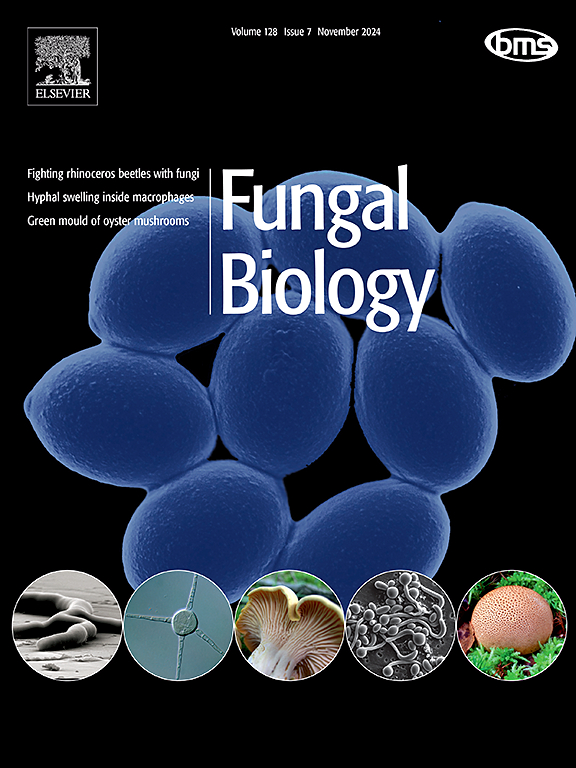Comparative analysis of the cellulolytic enzymatic ability of strains belonging to the genus Cladorrhinum (Podosporaceae, Sordariales, Ascomycota) and preliminary data for Cladorrhinum samala INTA-AR 59
IF 3
3区 生物学
Q2 MYCOLOGY
引用次数: 0
Abstract
Cladorrhinum, a genus of soil fungi belonging to the Podosporaceae family within the Sordariales order of the Ascomycota phylum, comprises several species with diverse physiological capabilities. While there are existing data on the cellulolytic activity of Cladorrhinum bulbillosum and Cladorrhinum foecundissimum, no reports are available on the potential of other species in this genus. In this study, different strains of Cladorrhinum were evaluated for carboxymethyl cellulase (CMCase) activity on solid medium, and the strains exhibiting the highest activity levels were selected. In liquid culture, Cladorrhinum samala INTA-AR 59 and C. samala INTA-AR 7 revealed maximum levels of endo-1,4-β-glucanase activity at 14 incubation d (27.55 ± 3.39 IU/L and 17.52 ± 0.87 IU/L, respectively), while C. samala INTA-AR 156 exhibited it at 31 incubation d (13.32 ± 3.59 IU/L). Concerning β-glucosidase activity, C. samala INTA-AR 59 and C. samala INTA-AR 156 displayed maximum levels of activity at 38 d (17.52 ± 0.87 IU/L and 0.5 ± 0.21 IU/L, respectively), and INTA-AR 7 at 31 d (9.44 ± 1.02 IU/L). Additionally, we present data on CMCase activity obtained through zymogram analysis of the C. samala INTA-AR 59 strain.
Cladorrhinum (Podosporaceae, Sordariales, Ascomycota)属菌株纤维素酶解能力与Cladorrhinum samala INTA-AR 59初步资料的比较分析
Cladorrhinum是子囊菌门Sordariales目Podosporaceae的一个土壤真菌属,由几个具有不同生理能力的物种组成。虽然有关于球茎Cladorrhinum bulbillosum和球茎Cladorrhinum foecundissimum的纤维素水解活性的现有数据,但没有关于该属其他物种潜力的报道。本研究对不同菌株Cladorrhinum在固体培养基上的羧甲基纤维素酶(CMCase)活性进行了评价,筛选出了活性最高的菌株。在液体培养条件下,山柑INTA-AR 59和山柑INTA-AR 7在培养14 d时内酰胺-1,4-β-葡聚糖酶活性最高(分别为27.55±3.39 IU/L和17.52±0.87 IU/L),而山柑INTA-AR 156在培养31 d时最高(13.32±3.59 IU/L)。在β-葡萄糖苷酶活性方面,柽柳inta - ar59和inta - ar156在38 d(分别为17.52±0.87 IU/L和0.5±0.21 IU/L)和inta - ar7在31 d(9.44±1.02 IU/L)时的活性最高。此外,我们还通过对C. samala INTA-AR 59菌株的酶谱分析获得了CMCase活性数据。
本文章由计算机程序翻译,如有差异,请以英文原文为准。
求助全文
约1分钟内获得全文
求助全文
来源期刊

Fungal biology
MYCOLOGY-
CiteScore
5.80
自引率
4.00%
发文量
80
审稿时长
49 days
期刊介绍:
Fungal Biology publishes original contributions in all fields of basic and applied research involving fungi and fungus-like organisms (including oomycetes and slime moulds). Areas of investigation include biodeterioration, biotechnology, cell and developmental biology, ecology, evolution, genetics, geomycology, medical mycology, mutualistic interactions (including lichens and mycorrhizas), physiology, plant pathology, secondary metabolites, and taxonomy and systematics. Submissions on experimental methods are also welcomed. Priority is given to contributions likely to be of interest to a wide international audience.
 求助内容:
求助内容: 应助结果提醒方式:
应助结果提醒方式:


